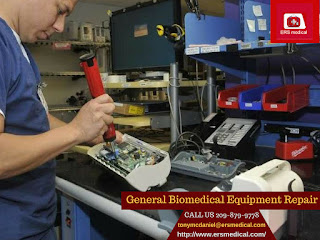If you use medical
equipment such as patient monitoring devices in a health care environment, you
know that their frequent use will lead to a slow deterioration over time. After
considerable wear of these devices, you must make the choice to replace the
equipment or seek out a reliable repair company. This takes some strategic
thinking. You must plan for the future of your organization and determine how
long you can maintain your equipment before sending it out for repair.
Is
It Necessary to Do Medical Equipment Repair Early?
Many factors must be
considered before sending your old piece of equipment out for repair. Does the
old equipment still meet the required benchmarks and guidelines for use? Has
technology advanced to the point where newer equipment performs better? If you do
decide to replace your equipment, does that new equipment require additional
supplies that would escalate the cost? Look at both sides when you conduct an analysis
and answer questions like these to help you determine your decision.
When considering
medical equipment repair, there are times when it may be impractical to use
these services; however, there are some reasons why it might be better to
replace your equipment.
- When repairing your equipment disrupts your flow of patient care, it may be detrimental to seek out and wait for repairs.
- If you have a piece of medical equipment that continuously fails, a replacement place may work better.
- When the cost for medical equipment repairs sharply rises, it may be cost-prohibitive to choose the repair route.
- If replacement parts are no longer available for your line of medical equipment, you might want to just upgrade to a new unit.
- Your patients may expect the latest innovations in medical equipment technology. Purchase new equipment in this case.
Planning
is Imperative
It’s important that you
know how long each piece of equipment will last. The average life expectancy
will help you determine when you should be budgeting for a reliable
replacement. In the years leading up to that point, it’s best to start
collecting data that lists common medical equipment repairs. With this
information, you can come up with a plan that tells you if you should replace
older ventilators, defibrillators, infusion pumps and suction units or have
them repaired by a certified general biomedical equipment repair technician
from a company like ERS Medical. Deciding to use a medical equipment repair
company does take some planning and analysis, but it may be cost-beneficial if
you decide to choose this option.

